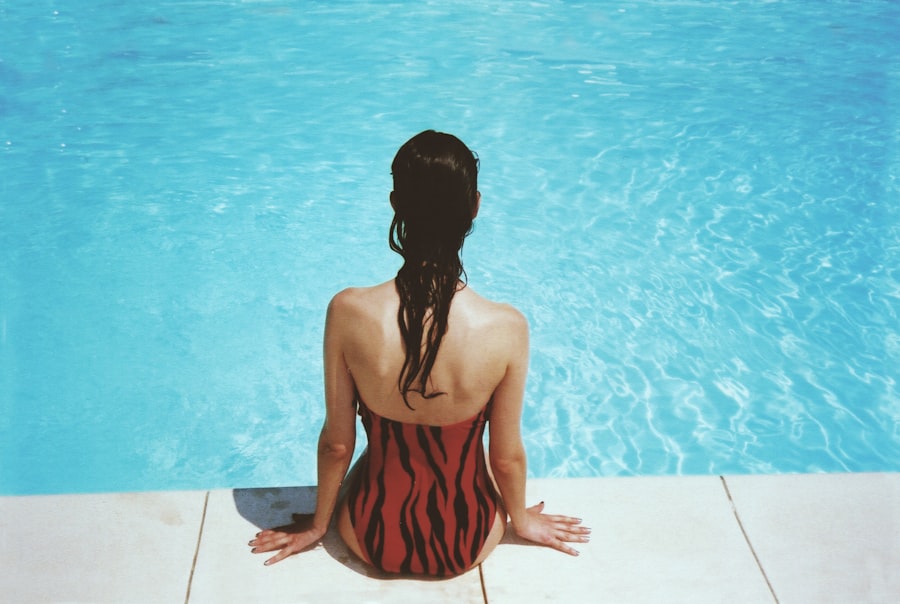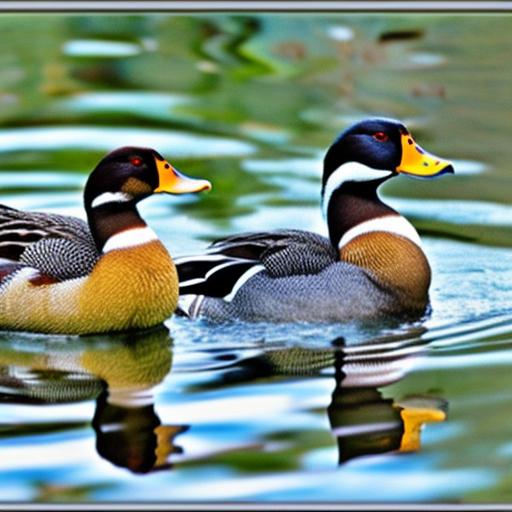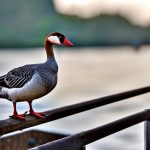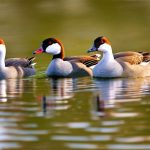Ducks and geese infesting pools can be a common problem for many pool owners. These birds are attracted to pools because they provide a source of water, food, and shelter. While it may seem harmless to have ducks and geese in your pool, it can actually pose several risks and dangers. It is important to address this issue to maintain the cleanliness and safety of your pool.
Having ducks and geese in your pool can lead to several problems. Firstly, their droppings can contaminate the water, making it unsanitary for swimming. This can lead to various health hazards, including skin infections and gastrointestinal illnesses. Additionally, ducks and geese can cause damage to the pool equipment and infrastructure. Their sharp claws can scratch the pool lining, while their constant presence can lead to increased wear and tear.
Key Takeaways
- Duck and geese infestation in pools can cause health and safety risks for humans and damage to pool equipment.
- Understanding the behavior of ducks and geese can help in implementing effective prevention measures.
- Physical barriers such as pool covers and fencing can keep ducks and geese out of pools.
- Chemical deterrents like taste aversion agents and repellents can also be effective in keeping ducks and geese away.
- Natural ways to keep ducks and geese away include using decoys, planting certain vegetation, and using noise deterrents.
Understanding the Behavior of Ducks and Geese
To effectively address the issue of ducks and geese infesting pools, it is important to understand their habits and behavior. Ducks and geese are migratory birds that are attracted to bodies of water for various reasons. They use pools as a source of water for drinking, bathing, and cooling off. Additionally, pools often provide a safe haven for these birds as they offer protection from predators.
Ducks and geese are also attracted to pools because they often find food sources nearby. Pools located near grassy areas or bodies of water with aquatic plants are particularly appealing to these birds as they provide a source of food. The presence of insects, worms, and small fish in the pool can also attract ducks and geese.
The Risks of Duck and Geese Infestation in Pools
Having ducks and geese in your pool can pose several risks and dangers. Firstly, their droppings can contaminate the water, making it unsanitary for swimming. Duck and geese droppings contain bacteria and parasites that can cause various health issues, including skin infections, eye infections, and gastrointestinal illnesses. These health hazards can be particularly dangerous for young children and individuals with weakened immune systems.
In addition to the health risks, ducks and geese can also cause damage to the pool equipment and infrastructure. Their sharp claws can scratch the pool lining, leading to costly repairs. Moreover, their constant presence in the pool can lead to increased wear and tear on the pool filters and pumps, reducing their lifespan.
Physical Barriers to Keep Ducks and Geese Out of Pools
One effective way to keep ducks and geese out of pools is by installing physical barriers. There are several options available for creating barriers that prevent these birds from accessing the pool area. One common method is to install a fence around the pool. The fence should be at least four feet high and have small gaps or mesh to prevent ducks and geese from squeezing through.
Another option is to use netting or covers to cover the pool when it is not in use. This prevents ducks and geese from landing in the water. The netting or covers should be securely fastened to ensure that the birds cannot get underneath.
It is important to regularly inspect and maintain these physical barriers to ensure their effectiveness. Any gaps or holes should be repaired promptly to prevent ducks and geese from finding their way into the pool area.
Chemical Deterrents for Ducks and Geese
In addition to physical barriers, there are also chemical deterrents available to keep ducks and geese away from pools. These deterrents work by creating an unpleasant environment for the birds, discouraging them from landing or swimming in the pool.
One common chemical deterrent is a bird repellent spray. These sprays contain ingredients that are unpleasant to ducks and geese, such as grape extract or methyl anthranilate. The spray can be applied around the pool area or directly onto the water surface. It is important to follow the instructions on the product label and use the spray safely and effectively.
Another option is to use floating devices that emit ultrasonic or sonic sounds. These devices emit high-frequency sounds that are irritating to ducks and geese, causing them to stay away from the pool area. It is important to place these devices strategically around the pool to ensure maximum effectiveness.
Natural Ways to Keep Ducks and Geese Away from Pools

For those who prefer natural methods, there are several options available to keep ducks and geese away from pools. One effective method is to use decoys or scare devices. Ducks and geese are territorial birds, so placing decoys of predators, such as owls or hawks, near the pool can deter them from landing or swimming in the water.
Another natural method is to create a hostile environment for ducks and geese. This can be done by planting certain types of vegetation around the pool that are unattractive to these birds. For example, plants with prickly leaves or strong odors can discourage ducks and geese from approaching the pool area.
It is important to note that natural methods may not be as effective as physical barriers or chemical deterrents. Ducks and geese can become accustomed to scare devices or adapt to hostile environments over time. Therefore, it is recommended to combine natural methods with other deterrents for maximum effectiveness.
Best Practices for Pool Maintenance to Avoid Duck and Geese Infestation
To prevent duck and geese infestation in pools, it is important to follow best practices for pool maintenance. Regular cleaning and maintenance can help deter these birds from using the pool as a source of water or food.
One important practice is to keep the pool clean and free of debris. Ducks and geese are attracted to pools with floating debris, such as leaves or twigs, as they provide a source of food. Regularly skimming the pool surface and removing any debris can help discourage these birds from landing in the water.
It is also important to maintain proper water chemistry in the pool. Ducks and geese are attracted to pools with stagnant or dirty water. Regularly testing and balancing the pool water can help keep it clean and unattractive to these birds.
Training Ducks and Geese to Stay Away from Pools
Another approach to addressing the issue of ducks and geese infesting pools is to train them to stay away. This can be done by using various methods that create negative associations with the pool area.
One method is to use noise deterrents, such as air horns or whistles, to scare ducks and geese away whenever they approach the pool. The loud noise creates a negative experience for the birds, making them less likely to return.
Another method is to use motion-activated sprinklers or water jets. These devices spray water whenever ducks or geese come near the pool, creating a negative experience for them. Over time, they will associate the pool area with this unpleasant sensation and stay away.
It is important to note that training ducks and geese requires consistency and patience. It may take several attempts before they learn to stay away from the pool area. It is also important to ensure that these training methods do not cause harm or distress to the birds.
Legal Considerations for Dealing with Ducks and Geese in Pools
When dealing with ducks and geese in pools, it is important to consider the legal aspects. In many areas, these birds are protected by wildlife laws and regulations. It is important to familiarize yourself with the local laws before taking any action.
In some cases, obtaining a permit may be required to remove or deter ducks and geese from your pool. It is recommended to contact your local wildlife agency or animal control for guidance on the legal requirements and procedures.
It is also important to note that certain methods of deterring ducks and geese may be prohibited by law. For example, using firearms or poisons to remove these birds is illegal in most areas. It is important to use legal and humane methods when dealing with ducks and geese in pools.
Conclusion and Final Tips for Keeping Ducks and Geese Out of Pools
In conclusion, ducks and geese infesting pools can pose several risks and dangers. Their droppings can contaminate the water, leading to health hazards, while their presence can cause damage to the pool equipment and infrastructure. It is important to address this issue by implementing physical barriers, using chemical deterrents, or employing natural methods.
Regular pool maintenance and cleaning are also essential to prevent duck and geese infestation. Following best practices for pool maintenance, such as keeping the pool clean and maintaining proper water chemistry, can help deter these birds from using the pool as a source of water or food.
Training ducks and geese to stay away from pools can also be effective. Using noise deterrents or motion-activated sprinklers can create negative associations with the pool area, discouraging these birds from returning.
It is important to consider the legal aspects when dealing with ducks and geese in pools. Familiarize yourself with the local laws and regulations, and ensure that you are using legal and humane methods to address this issue.
By taking action to keep ducks and geese out of pools, you can maintain the cleanliness and safety of your pool while also protecting the health of those who use it.
If you’re tired of dealing with ducks and geese invading your pool, you’ll definitely want to check out this helpful article on Poultry Wizard. They provide some great tips and tricks on how to keep these feathered intruders out of your swimming area. From installing pool covers to using decoys, they’ve got you covered. So, if you’re ready to reclaim your pool and enjoy a hassle-free swim, head over to Poultry Wizard’s article on how to keep ducks and geese out of pool.
FAQs
What are some common problems caused by ducks and geese in pools?
Ducks and geese can leave behind droppings, feathers, and debris in the pool, which can make the water unsanitary and unappealing for swimming. They can also damage pool equipment and surfaces with their sharp claws and beaks.
What are some effective ways to keep ducks and geese out of the pool?
Some effective ways to keep ducks and geese out of the pool include installing a pool cover, using decoys or scare devices, and creating physical barriers such as fences or netting. It is also important to remove any food sources or nesting materials that may attract them to the pool area.
Are there any humane methods for keeping ducks and geese away from the pool?
Yes, there are several humane methods for keeping ducks and geese away from the pool. These include using visual deterrents such as reflective tape or balloons, playing loud noises or using motion-activated sprinklers, and planting vegetation that is unappealing to waterfowl.
What should I do if ducks or geese have already made a nest in or near my pool?
If ducks or geese have already made a nest in or near your pool, it is important to contact a wildlife professional for assistance. It is illegal to disturb or harm nesting waterfowl, and attempting to remove the nest or eggs yourself can result in fines or legal consequences.
How can I prevent ducks and geese from returning to my pool in the future?
To prevent ducks and geese from returning to your pool in the future, it is important to remove any food sources or nesting materials that may attract them. You can also use a combination of the methods mentioned above, such as installing a pool cover and using visual deterrents, to make your pool area less appealing to waterfowl.
Meet Walter, the feathered-friend fanatic of Florida! Nestled in the sunshine state, Walter struts through life with his feathered companions, clucking his way to happiness. With a coop that’s fancier than a five-star hotel, he’s the Don Juan of the chicken world. When he’s not teaching his hens to do the cha-cha, you’ll find him in a heated debate with his prized rooster, Sir Clucks-a-Lot. Walter’s poultry passion is no yolk; he’s the sunny-side-up guy you never knew you needed in your flock of friends!







